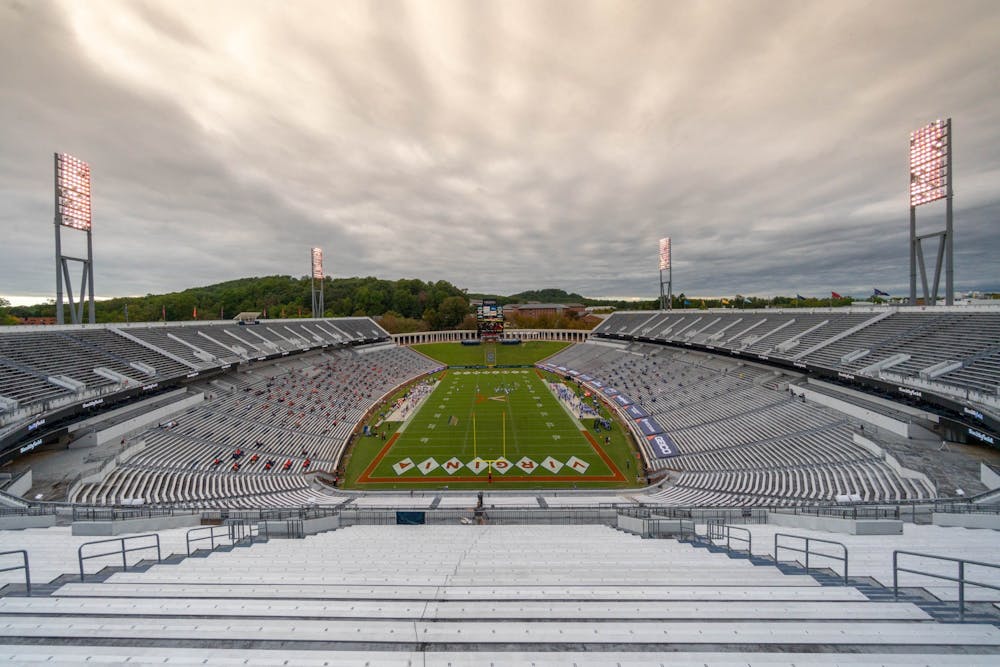Lea en español
New University COVID-19 guidelines went into effect Sept. 23 mandating mask-wearing and barring students and faculty from gathering in groups larger than five or traveling to or from Charlottesville. Three days later, fans from in and outside of Charlottesville flocked to Scott Stadium to watch on as Virginia Football secured a 38-20 win against Duke University in the team’s season opener.
Virginia football’s fourth consecutive home-opener victory adhered to protocols outlined by state and University protocols — a maximum of 1,000 family members of student-athletes and coaches were allowed to attend, and all in attendance were required to wear masks, practice social distancing and sit in groups fewer than five. The ACC has left it up to the staff of each venue to determine the exact protocol for safe entry — at a minimum, universities are required to check both temperature and symptoms of individuals seeking access to the field, team areas and locker rooms.
And football players have been, and continue to be, tested for COVID-19 three times per week.
While non-athlete students report being forced to exaggerate symptoms or exposures in order to receive a test from Student Health and Wellness, athletes on the University’s football, field hockey, volleyball, men’s soccer and women’s soccer teams receive thrice weekly COVID-19 tests in accordance with ACC Medical Advisory Group requirements.
“The more frequent testing of U.Va. student-athletes reflects the nature of the sports they play, which often requires athletes to come into close or direct physical contact,” the University said in a statement. “In order to keep our student-athletes, coaches and the people they come into contact with healthy and to make competition possible, we follow the standards for enhanced testing.”
1,168 COVID-19 tests were performed on student-athletes between Sept. 21 and Sept. 27, comprising 26 percent of the 4,488 tests performed in the Thomas Jefferson Health District in the same time period.
All tests performed on student-athletes — except for one of the three tests performed on football players — are administered by U.Va. Health. The University’s COVID Tracker only reflects those tests administered by U.Va. Health, and between Sept. 20 and Sept. 26, 2,362 University students were tested for COVID-19. The University began random population testing earlier last month, and this week, it began using rapid saliva tests to test both asymptomatic and symptomatic students.
The third test performed on football players is administered by an independent third-party testing service, Mako Medical, prior to competitions.
In total, Virginia Athletics has reported 64 total cases of COVID-19 — though the Cavaliers currently have 765 student-athletes, these cases could belong to any student athlete, coach or member of Virginia Athletics’ support staff.
Virginia football, which was the first program to return for training July 5, has reported three total cases of COVID-19. Ahead of Saturday’s game against Clemson, the team reported that one full-time coach had tested positive and seven student-athletes had either tested positive for or been exposed to the virus, disqualifying them from playing.
Prior to Saturday’s game, Virginia football’s three cases accounted for 4.6 percent of the cases reported by Virginia Athletics.
Virginia football is also the only team that Virginia Athletics specifies positive cases for, so the other 61 of Virginia’s 64 cases could belong to any one of the Cavaliers’ 26 other varsity programs. In its most recent testing update Sept. 28, Virginia Athletics reported 22 positive results among student-athletes within the previous week.
Athletic teams are tested in accordance with their risk assessment — a metric determined by the ACC’s Medical Advisory Group, a group that meets weekly to share information related to the impact of COVID-19 on college campuses and the return of college sports.
Football, volleyball, field hockey, soccer, lacrosse, basketball, wrestling and rowing have been determined “high-risk” sports by the Medical Advisory Group.
According to the group’s standards, football teams — and those in close contact with the team, such as coaches and support staff — must be tested three times per week beginning with the week of the first competition against an opposing team. At least one PCR test must be administered within three days of the day of the game and an additional test must be administered the day before the competition.
For all other high-risk sports, student-athletes and those in close contact with them must be tested three times per week beginning with the week of the first competition against an opposing team, at least one of which must be a PCR test.
Baseball, softball and cross country are considered “medium-risk” sports. As such, all team members are required to participate in testing every other week beginning with the week of the first competition against an opposing team.
Finally, fencing, swimming and diving, golf, tennis and track and field have been determined “low-risk” sports and the ACC does not require student-athletes to participate in testing prior to competition.
Student-athletes who test positive for COVID-19 are not subject to weekly testing for a period of 90 days following their positive test, unless they exhibit symptoms.
Correction: An earlier version of this article misstated the number of varsity sports teams at the University and misstated that 7 football players had tested positive for COVID-19 ahead of the team's game against Clemson University. The article has been corrected to reflect that 7 football players had either tested positive for or been exposed to the virus, disqualifying them from playing.
Correction: An earlier version of this article misstated that the ACC set protocols for mask-wearing, social distancing, and capacity at football games and that in its most recent testing update, Virginia Athletics reported 22 cases of COVID-19 within the last two weeks. The article has been corrected to reflect that the state and the University set social distancing, masking, and capacity guidelines and that the 22 cases were reported within a one-week period.







